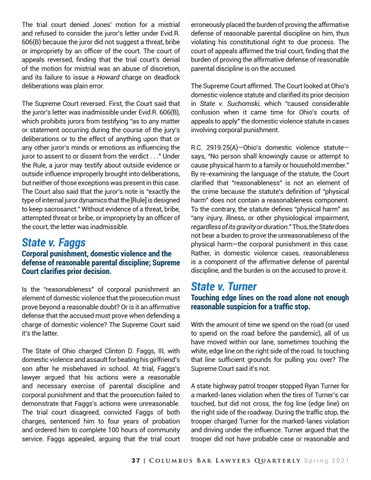The trial court denied Jones’ motion for a mistrial and refused to consider the juror’s letter under Evid.R. 606(B) because the juror did not suggest a threat, bribe or impropriety by an officer of the court. The court of appeals reversed, finding that the trial court’s denial of the motion for mistrial was an abuse of discretion, and its failure to issue a Howard charge on deadlock deliberations was plain error. The Supreme Court reversed. First, the Court said that the juror’s letter was inadmissible under Evid.R. 606(B), which prohibits jurors from testifying “as to any matter or statement occurring during the course of the jury’s deliberations or to the effect of anything upon that or any other juror’s minds or emotions as influencing the juror to assent to or dissent from the verdict . . .” Under the Rule, a juror may testify about outside evidence or outside influence improperly brought into deliberations, but neither of those exceptions was present in this case. The Court also said that the juror’s note is “exactly the type of internal juror dynamics that the [Rule] is designed to keep sacrosanct.” Without evidence of a threat, bribe, attempted threat or bribe, or impropriety by an officer of the court, the letter was inadmissible.
State v. Faggs
Corporal punishment, domestic violence and the defense of reasonable parental discipline; Supreme Court clarifies prior decision. Is the “reasonableness” of corporal punishment an element of domestic violence that the prosecution must prove beyond a reasonable doubt? Or is it an affirmative defense that the accused must prove when defending a charge of domestic violence? The Supreme Court said it’s the latter. The State of Ohio charged Clinton D. Faggs, III, with domestic violence and assault for beating his girlfriend’s son after he misbehaved in school. At trial, Faggs’s lawyer argued that his actions were a reasonable and necessary exercise of parental discipline and corporal punishment and that the prosecution failed to demonstrate that Faggs’s actions were unreasonable. The trial court disagreed, convicted Faggs of both charges, sentenced him to four years of probation and ordered him to complete 100 hours of community service. Faggs appealed, arguing that the trial court
erroneously placed the burden of proving the affirmative defense of reasonable parental discipline on him, thus violating his constitutional right to due process. The court of appeals affirmed the trial court, finding that the burden of proving the affirmative defense of reasonable parental discipline is on the accused. The Supreme Court affirmed. The Court looked at Ohio’s domestic violence statute and clarified its prior decision in State v. Suchomski, which “caused considerable confusion when it came time for Ohio’s courts of appeals to apply” the domestic violence statute in cases involving corporal punishment. R.C. 2919.25(A)—Ohio’s domestic violence statute— says, “No person shall knowingly cause or attempt to cause physical harm to a family or household member.” By re-examining the language of the statute, the Court clarified that “reasonableness” is not an element of the crime because the statute’s definition of “physical harm” does not contain a reasonableness component. To the contrary, the statute defines “physical harm” as “any injury, illness, or other physiological impairment, regardless of its gravity or duration.” Thus, the State does not bear a burden to prove the unreasonableness of the physical harm—the corporal punishment in this case. Rather, in domestic violence cases, reasonableness is a component of the affirmative defense of parental discipline, and the burden is on the accused to prove it.
State v. Turner
Touching edge lines on the road alone not enough reasonable suspicion for a traffic stop. With the amount of time we spend on the road (or used to spend on the road before the pandemic), all of us have moved within our lane, sometimes touching the white, edge line on the right side of the road. Is touching that line sufficient grounds for pulling you over? The Supreme Court said it’s not. A state highway patrol trooper stopped Ryan Turner for a marked-lanes violation when the tires of Turner’s car touched, but did not cross, the fog line (edge line) on the right side of the roadway. During the traffic stop, the trooper charged Turner for the marked-lanes violation and driving under the influence. Turner argued that the trooper did not have probable case or reasonable and
37 | Columbus Bar L aw yers Quarterly Spring 2021
